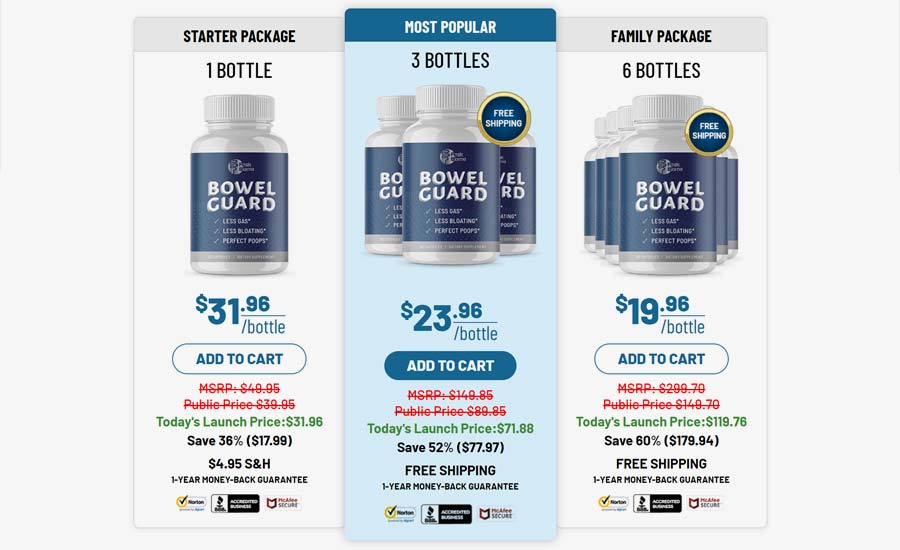Did you know that the body’s natural source of digestive enzymes starts to deplete from the moment you turn 20? As the aging process continues, and factors including chronic stress, alcohol consumption, and environmental toxins take the storm, these enzymes continue to decrease in strength. What can be done to replenish the continued depletion of enzymes while protecting oneself against smelly gas, frequent diarrhea attacks, and poor energy, among others? This is where it is best fit to introduce Bowel Guard by Peak Biome.
As the name suggests, this dietary supplement is designed to guard up the digestive tract so that individuals do not have to worry about the consequences of eating certain foods or drinking certain beverages. What is it that makes it so effective? The answer is digestive enzymes, but that’s just a piece of the entire puzzle. The purpose of this review is to shed light on Bowel Guard from every possible angle. Here’s what we’ve gathered to date:
What is Bowel Guard?
Bowel Guard is a completely natural digestive enzyme formula that aims to increase a specialized gut fluid. This is what allows one to enjoy their preferred foods without having to worry about gas or bloat, smelly farts, and strict diet programs, among others. Most of all, individuals can anticipate perfectly firm poop, regardless of what they consume.
Based on the advertisement found on the official website, the founder of Peak Biome, Jeremy, shared that his experiences with bowel irregularities and inconsistencies in stools was what led the team to launch Bowel Guard. So, if taking probiotics, cutting back on certain foods, and taking anti-diarrhea pills just don’t work, what will? This is where it is imperative to assess how Bowel Guard is meant to work.
How does Bowel Guard work?
Bowel Guard has been formulated to deliver a handful of specific digestive enzymes that help to produce firm stools while blocking the effects of hydrogen sulfide gas. According to existing claims, the bacterial content in the digestive tract is what determines the odor of passing gas. For instance, those who’ve experienced the odor of rotten eggs; this is when the existing bacteria work towards converting food-derived sulfur into hydrogen sulfide. In addition to bad farts, this is what causes individuals to take frequent trips to the bathroom and to suffer through unbearable abdominal pain.
How might enzymes help to put an end to such miseries? For one, they are naturally produced in the mouth, stomach, pancreas, and small intestine. Second, they are essential in breaking down everything we eat and in making sure that the nutrients are delivered to the rightful owners. Above all, when all of our enzymes work together, they go well beyond supporting digestive health, which is exactly why the body is beautiful.
With all that in mind, it is important to note that taking just about any digestive enzyme will not help the situation. In fact, there are a lot of factors that go into choosing the right ones. In creating Bowel Guard, Peak Biome focused on:
- Differentiating between the different roles each enzyme plays
- Retorting to plant-based enzymes for the sole reasons of supporting stomach acid and pre-digesting food
- Choosing active over inactive enzymes
- Ensuring that each enzyme is delivered at precise quantities that are revealed to the public
What ingredients are found in Bowl Guard?
Now that it is clear as to how Bowel Guard works, and what makes an enzyme good or bad, let’s dive right into the ingredients list:
Saccharomyces Boulardii (3 Billion CFU)
Saccharomyces Boulardii is an FDA approved yeast that is known to secrete digestive enzymes. It is most commonly used to prevent diarrhea, especially the infectious types. However, this ingredient can be a hit or miss, as some studies have linked it to improvements, while others showed no changes.
Lipase (375 FIP)
Created in the pancreas, lipase is a type of enzyme that helps the body break down fat. Given that it is a pancreatic enzyme, this naturally implies that individuals can anticipate reduced bloating and discomfort while achieving satiety.
Lactase (900 ALU)
As the name suggests, lactase is a type of digestive enzyme that breaks down lactose. The reason why some people can’t drink milk is because this respective enzyme is missing in their body. Upon ingestion, one can anticipate reduced symptoms associated with lactose intolerance, diarrhea, and gas.
Peptidase with DPP (22,500 HUT)
Also referred to as Dipeptidyl peptidase IV, these are essential enzymes that help to regulate not only how we eat and the overall digestion of food, but also the strength of our immune systems and infection prevention, among others.
Cellulase (640 CU)
Cellulase is a type of enzyme that helps to break down vegetables and gluten for crucial nutrients. This is especially important considering that the body does not naturally break down plants. With the presence of cellulase, the body remains up and running when it comes to moving food through and out as waste.
Protease (30,000 HUT)
Protease is a type of enzyme that has been assigned a number of roles when it comes to digesting protein. In particular, it breaks down protein into amino acids, which are then utilized by the body for energy purposes. Some of its associated benefits entail rectifying loss of appetite, bloating, muscle aches, blot clots, and abdominal discomfort, to name a few.
Amylase (9,000 DU)
Amylase is a type of enzyme that helps to break down starches and complex carbs into simple sugars. This respective enzyme is said to be activated upon chewing, which is why it is often endorsed to chew food before swallowing.
Invertase (300 SU)
Invertase is an enzyme that has been tasked with breaking down sugar into glucose and fructose. The duo is what maximizes energy production, while fulfilling carbs break down as much as possible. It turns out that invertase can also help boost the immune system, induce recovery, and prolong aging processes, to name a few.

Frequently Asked Questions (FAQS)
The rise in popularity of Peak Biome Bowel Guard supplement warrants many questions that will help users optimally understand the product at hand. Here are the most pertaintant inquiries regarding the trending Bowel Guard formula and how to get the best results using the product.
What is the recommended serving size?
The recommended serving size is two capsules per day, every day until perfectly firm poop is produced consistently. In doing so, it is probable to experience:
- Bowel regularity
- Decrease is bowel odor
- Lactose and gluten digestion
- Boost in energy levels and the immune system
- Healthy microbiome
How many Bowel Guard bottles should be purchased?
This depends on each unique goal set in place. For instance, if individuals simply want to give Bowel Guard a try to see whether they can tolerate it, one bottle is best. Three bottles are for anyone looking for the “best possible experience.” Finally, six bottles provide the added benefit of saving much more money per bottle than any other offer.
Is Bowel Guard safe?
Bowel Guard has been generally accepted as being safe because it not only contains the highest possible natural ingredients but also has undergone rigorous testing for purity and potency. If individuals have concerns regarding possible interactions with other medications, a health practitioner’s opinion should be sought for.
What is the expected wait time before seeing results?
Given that each person is unique on so many factors, the results can drastically vary. On average, initial differences can be witnessed as early as two to three days, while others might need a couple of weeks. To ensure that this experience is as smooth as it gets, individuals will be provided with complete instructions that maximize results.
Are there any allergy concerns linked to Bowel Guard?
While digestive enzymes are considered safe, individuals need to bear in mind that Bowel Guard was manufactured in a facility that also processes milk, eggs, wheat, and soy. If anyone is allergic to the aforementioned food items, they should proceed with caution when it comes to taking this supplement.
Is Bowel Guard backed by a money-back guarantee?
Yes, Bowel Guard has been protected by a 365-day money-back guarantee, which makes it practically risk-free to try. If individuals come to realize that they aren’t witnessing consistently firm poop and odorless farts, it is as simple as contacting customer service and requesting a full refund. To get in touch with customer service, click here.
How much does Bowel Guard cost?
Given that each bottle is meant to last one full month, the below prices break down will give a better sense as to which quantities are desirable:
- 1 Bowel Guard bottle: $39.95 each + free S&H on U.S. orders
- 3 Bowel Guard bottles: $29.95 each + free S&H on U.S. orders
- 6 Bowel Guard bottles: $24.95 each + free S&H on U.S. orders
- Click Here to Buy Bowel Guard for the Best Price with Exclusive Discounts Now
It is imperative to mention that U.S. orders can take up to 10 business days to receive, and international orders can anticipate up to 15.
Final Thoughts
Peak Biome is one of the leading health and wellness supplement formulators in the world. With the success of Peak BioBoost and now Bowel Guard, Peak Biome’s supplements are always up for strong considerations as premium quality options to go forward with. Based on the analysis above, it is clear that Bowel Guard focuses on the power digestive enzymes have on bowel irregularities. What makes this supplement stand out is that the selected enzymes all work to predigest food and prevent nutrients from getting fermented into the more toxic hydrogen sulfide gas. Most of all, digesting food is done at peak levels, which means that the body can fully absorb the nutrients it requires.
In terms of the enzymes themselves, a lot of care seems to have gone into picking them. In fact, Peak Biome avoided listing the ingredients under a proprietary blend. This shows that they are true examples of what it means to be transparent. For these reasons, the prices are extremely fair, not to forget that individuals are provided with a full year to assess whether Bowel Guard is right for them or not. For more on Bowel Guard and its formula, visit here.
Advertising disclosure: We may receive compensation for some of the links in our stories. Thank you for supporting LA Weekly and our advertisers.




